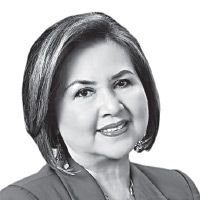The Beijing EFA Summit analyzes the 2006 Global Monitoring Report

January 19, 2006 | 12:00am
Our own UNESCO Asian expert, Mrs. Lucille Gregorio, the lead Senior Education Consultant, gave logistic support at this Beijing conference from September to December 2005. For 15 years, Lucille served as Program Specialist for Science and Technology Education at the Asia Pacific Regional Bureau for Education, UNESCO Bangkok and is currently a Consultant at the UNESCO National Commission of the Philippines. She provided the highlights of the 5th High Level Group Meeting convened by UNESCO in Beijing on 28-30 November 2005.
The basis for holding such meetings is the Dakar Framework for Action (Para 19) which states that "UNESCO Director-General will convene annually a high-level, small and flexible group. It will serve as a lever for political commitment and technical and financial mobilization. Informed by a monitoring report… it will also provide an opportunity to hold the global community to account for commitments made in Dakar. It will be composed of highest level leaders from governments and civil society of developing and developed countries, and from development agencies".
Prime Minister Wen Jiabao, on that opening session, pledged to substantially increase China’s contribution to education development throughout the world so as to accelerate progress toward the EFA goals. The Premier pledged to train 1,500 teachers from developing countries annually over the next three years, donate 100 experimental rural schools to developing countries over the same time, and increase the number and value of scholarships and university places for students from developing countries to 10,000 annually. He also promised to increase financial support for developing countries hit by natural disasters and to grant US$1 million in aid to pertinent research and training projects undertaken by UNESCO’s International Institute for Capacity-Building in Africa and the UNESCO International Centre for Girls and Women’s Education in Africa.
He emphasized, "It is also clear that the quality of basic education remains low and will not lead to meaningful learning outcomes unless tackled with renewed vigor." If not given attention, the ten years towards the 2015 target in attaining the EFA goals would be jeopardized in as many as 86 countries, including the Philippines. Emphasis has to be on "Education of Rural People (ERP)" since 70 percent of the population of developing countries are in rural areas.
Launched in 2002, FTI is a response to the challenge that over 100 million children do not attend primary schools in developing countries, girls making up 58 percent. A global partnership providing Education for All for children from low-income countries, this is a mutual commitment between donors and developing countries to ensure accelerated progress towards the core EFA goal of universal primary completion (UPC) for boys and girls alike by 2015. The goals are to promote more efficient aid for primary education, sustained increases in aid for primary education, sound sector policies in education, adequate and sustainable domestic financing for education, and increased accountability for sector results.
The critical link between child labor and education has been highlighted in 1992, when the International Labor Organization (ILO) underlined its International Programme on the Elimination of Child Labor (IPEC). Actions are based on the political will and commitments of individual governments to address the problem, and operate a phased and multi-sectoral strategy, which motivates broad alliance of partners to acknowledge and act against child labor. Sustainability is built in from the start through an emphasis on in-country ownership.
Last December 27, 2005, President Gloria Macapagal Arroyo signed Executive Order No. 483 "Establishing the UNESCO Lifelong Learning Center for Sustainable Development of the Philippines and designating Operation Brotherhood Montessori Center, Inc. as the national laboratory of the Department of Education (DepEd), Commission on Higher Education (CHED), and Technical Education and Skills Development Authority (TESDA) in addressing the life skills educational requirements toward building a knowledge society."
This will attain the requirement of UNESCO Director General Koichiro Matsuura to mobilize the lengthy process of the UNESCO Executive Board and the Paris Secretariat to help the Philippines put together the elements of the Center to be a major agency to combat illiteracy for poverty reduction.
In next week’s column, I will discuss the details of the EFA Flagships and UNESCO’s "LIFE — Literacy Initiative for Empowerment", as well as how these initiatives would impact on attaining EFA by 2015 in our country.
(For more information or reaction, please e-mail at [email protected] or [email protected])
BrandSpace Articles
<
>
- Latest
- Trending
Trending
Latest
Trending
Latest
Recommended

January 20, 2025 - 12:00am























